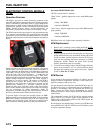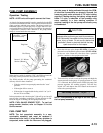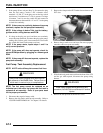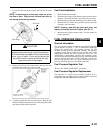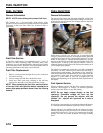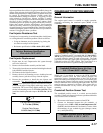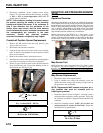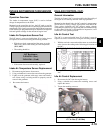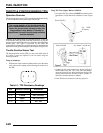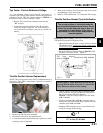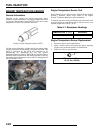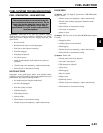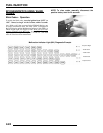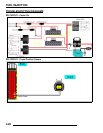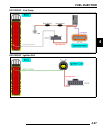
4.20
FUEL INJECTION
THROTTLE POSITION SENSOR (TPS)
Operation Overview
The throttle position sensor (TPS), mounted to the throttle body,
is used to indicate throttle plate angle to the ECM.
Mounted on the throttle body and operated directly off the end
of the throttle shaft, the TPS works like a rheostat, varying the
voltage signal to the ECM in direct correlation to the angle of the
throttle plate. This signal is processed by the ECM and
compared to the internal pre-programmed maps to determine the
required fuel and ignition settings for the amount of engine load.
Throttle Position Sensor Test
The throttle position sensor (TPS) is a non-serviceable item. If
it is faulty, it must be replaced. It can be tested using the
following method:
Using an ohmmeter-
1. With the test leads connected and the meter set to the ohms
scale, observe the reading at the following pin locations of
the TPS:
Using TPS Test Adapter Harness 2201519-
• Set up the TPS Test Harness 2201519 according to the
instructions. Verify that the 9 volt battery is new. Figure
2
• Connect the test leads connected as shown in Figure 2
and the meter set to the “vdc” scale, move the throttle
open and closed slowly while reading the display. The
voltage should increase smoothly with no “jumps” or
decreases when the throttle is applied.
• If the TPS does not function correctly, replace it.
The correct position of the throttle body idle
stop is established and set at the factory. Do not
loosen the throttle body idle stop or alter the
stop position in any fashion. If the stop is
repositioned, the entire throttle body assembly
must be replaced.
Table 4-1: TPS Resistance Readings
Pin Throttle Position Resistance
d-GND
-----
c
-d
Closed
4K(reference)
c-d
Open
820(reference)
c-e
-----
4k6k
1
2
3
Use NEW
9V battery
Tester 2201519
Tester 2201519
No “Jumps” in read out



